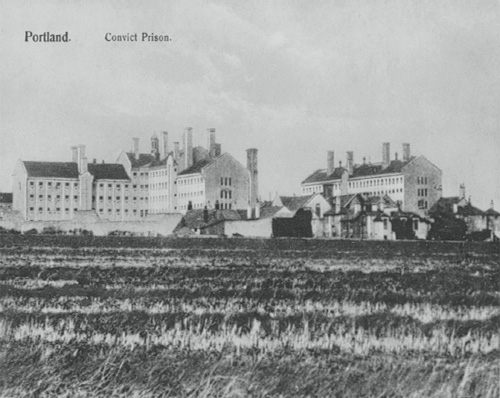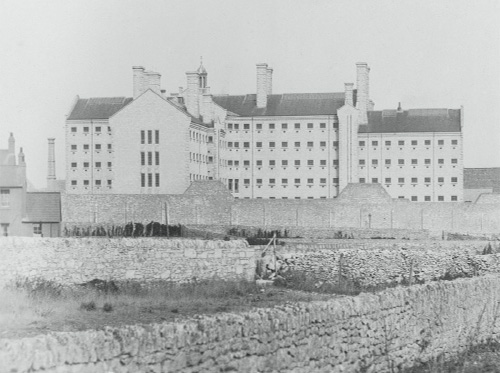Dorset Murders (7 page)

It took several officers to overpower him and, when the Army claimed him, the escorting officers had to keep him shackled hand and foot. He was subjected to a disciplinary hearing in Pembrokeshire, where he was dishonourably discharged and sent on his way. Soon afterwards he was arrested for stealing some clothes and given a three-year prison sentence, to be served at Haverfordwest.
Finding Preedy too much of a handful, the Welsh authorities had him transferred to Milbank Prison in London, where he attacked and injured a warder in one of his rages, receiving a flogging as a result. Memories of his ill treatment at the hands of his stepfather came flooding back and, from that moment on, his behaviour became more and more crazed until it was decided that there was only one place for him â Portland Convict Prison, the toughest prison in England.
On 8 September 1862, three prisoners â Thomas Moore, John Ashton and James Schofield â walked along the landing of Portland Prison. Under the supervision of warder Charles Evans, it was their job to collect from each prisoner the empty food tin that had contained his supper and the knife with which he had been issued in order to eat it. As they opened the door to Cell 727, Preedy was standing waiting to pass over his cutlery. As Moore approached him to take the utensils, at the very last minute Preedy dropped the tin and, still holding the knife, pushed past Moore onto the landing. Before any of the men could react, Preedy seized Warder Evans from behind and stabbed him in the throat, twisting the knife violently.
Moore and Ashton each grabbed one of Preedy's arms while Schofield set off to fetch help. As soon as he was released from Preedy's grasp, Evans reflexively staggered a few steps before dropping to the floor, dead.

Portland Convict Prison, late 1800s
.
Reinforcements arrived in the form of Warder Thomas Roberts, who quickly assessed the scene then drew his cutlass and hit Preedy over the head with the flat of the blade, rendering him unconscious. By the time Preedy came round again, he was safely shackled.
Asked why he had stabbed Evans, Preedy maintained that there was something between the two men. Saying that he was glad that Evans was dead, Preedy explained that he had eaten his supper, read his Bible and then decided to kill Evans.
Preedy received a visit from prison chaplain, Mr Duke, but that was enough to send him into another rage. As soon as Duke had left the cell, Preedy was once more calm and polite, explaining to Warder James Douglas that he was a Catholic.
The task of moving Preedy to Dorchester Prison fell to Superintendent Underwood of the Dorset Police. Approaching the job with trepidation, Underwood was pleasantly surprised to find Preedy calm and compliant and expressing remorse for killing Warder Evans, having since been told that Evans was a married man with several children. Preedy confessed that there was nothing personal between him and his victim. People had been picking on him and he had simply made up his mind to kill the first warder that came along.
Preedy's apparent complacency lulled warders at Dorchester Prison into a false sense of security. Placed in solitary confinement, he ranted, raved and tried to injure himself, having to be kept naked as he immediately destroyed any clothing he was issued with. The prison governor, Mr J.V.D. Lawrence, knew that being kept in solitary confinement was what was upsetting Edwin, but did not dare move him in with other prisoners for fear of him killing someone.
Edwin Preedy behaved like a madman for the first month of his stay in Dorchester, but eventually calmed down and became a model prisoner. He took to nursing injured birds back to health and was absolutely heartbroken when he accidentally stepped on one of his âpatients' and killed it.
Preedy's mild-mannered behaviour lasted until his trial at Dorchester Assizes before Judge Sergeant Shea. As the trial opened, Preedy was asked whether he pleaded guilty or not guilty, to which he responded, âI did the act, but not intentionally, sir'. When told he must either say âGuilty' or âNot Guilty', after apparently giving the matter some thought, he chose the latter.
Before long, he violently objected to evidence given by Thomas Moore and tried to vault over the edge of the dock to get to him. As guards did their best to hold him, he rained blows on them. It took ten men to finally subdue him, then, with his arms pinioned by his sides, the court watched in astonishment as Preedy, in an attempt to choke himself, managed somehow to throw his own head back so far that he was able to bite a piece of the cloth from the back of his own jacket. When the guards restrained him even tighter, he then tried to bite pieces from the wooden edge of the dock.
Mr Good, the prison surgeon, tried to calm him. By now Preedy was all smiles again, offering to shake hands with the surgeon. When Good declined, Preedy once more flew into a tantrum.
Eventually the judge could take no more. After asking Good if he thought Preedy fit to stand trial and receiving an affirmative reply, he turned to Preedy and offered him a ten-minute break to compose himself. When Preedy didn't respond, the clerk of the court, Mr Corne, repeated the question to him, prompting a rambling discussion from the prisoner about how and where he knew Corne. Saying that Corne was a man that he could trust and offering to shake hands with him, Preedy refused to acknowledge anybody in court but Corne, cursing and shouting if Mr Good tried to approach him.
Reluctantly, Judge Shea informed the court that he was perfectly satisfied that Preedy was sane, but, for everyone's safety, Preedy must be restrained before proceedings could continue. Two broad leather belts were fetched and used to strap Preedy's legs together and to pin his arms to his sides. However, before Shea could pick up the trial where he had left off, Preedy tensed his muscles and both belts snapped with loud cracks. Warders just managed to grab him before he leapt from the dock.
Shea stormed out of the court to consult with a colleague, Mr Justice Byles, returning some time later having given orders that Preedy was to be shackled in chains. This done, Preedy alternately fought against his bindings and slumped exhausted in the dock, appearing to sleep. The judge eventually adjourned the trial for a short period of consultation with Mr Good, local doctor Alfred Emson and the surgeon from Portland Prison, William Houghton. Finding himself seriously doubting Preedy's sanity, Shea sought the opinions of the three medical men as to whether or not the prisoner was fit to stand trial. Having been assured by all three doctors that he was, Shea resumed the trial.
Among those giving evidence at the trial were Preedy's mother, who testified to his fall downstairs, his strangeness in childhood and the terrible beatings he had received at the hands of his stepfather. At one point Ann Preedy fainted and, trying vainly to reach her, Preddy fell sideways off his chair in a crash of chains.
By the time the jury had retired for about half an hour and returned with a verdict of âguilty of wilful murder' against Preedy, the accused was once again docile and calm enough to hear the judge pronounce the death sentence upon him.
In doing so the judge told Preedy that at least he would have time to make his peace with the Almighty God, a privilege that had been denied his victim and, after the trial, Edwin Preedy spent a lot of time in the company of the Revd H. Moule, the vicar of Fordington. Moule was not a priest, but it didn't matter because Preedy was not a Catholic. When a kindly, well-meaning Catholic from Chideock tried to arrange a prison visit from a priest for him, Preedy sent him a message saying that he was not, had never been, and would never be a Catholic.
Through Moule, Preedy made a full confession, adding that to be executed was a just punishment for a sinner such as he. He admitted to feigning madness at his trial in the hope of avoiding the death sentence. When asked why he hadn't just punched Evans rather than stabbed him, Preedy pointed out that the last time he had tried punching someone he had been flogged.
As the date of his execution approached, Preedy asked Moule to procure several small Bibles for him. He then inscribed each one personally and presented one to all the prison warders to whom he had been abusive. He also spent time making bead rings, one of which he was to give to executioner Calcraft as he mounted the scaffold.
On 27 March 1863, twenty-year-old Preedy stood at the scaffold in the company of Charles Fooks (see Chapter 5). Preedy was calm and contrite, wanting to shake hands with the prison governor and the under-sheriff and was visibly hurt when they snubbed him. A crowd of almost 5,000 people watched as Preedy took the drop, not dying instantly but instead kicking and convulsing violently for some time before finally becoming still. After hanging for an hour, the two bodies were cut down and buried within the confines of the prison walls.

Portland Borstal Institution, 1930s
.

Convicts going to work at the stone quarries, Portland Prison, 1917
.
Historically, the regime in Portland Prison was harsh and brutal. Opened in 1848, the death rate amongst inmates was unusually high, and suicides and attempted suicides were commonplace. During the 1870s an average of one inmate died every week. Preedy's fatal attack on Warder Charles Evans is just one of several fatalities recorded among both guards and prisoners.
On 23 March 1869, Jonah Dethridge, a native of Wednesbury, killed Assistant Warder Jospeh Trevett by striking him over the head with a steel-tipped pick. About three weeks previously, Trevett had reported Dethridge for insolence and Dethridge had been punished. On the morning of the murder, Dethridge, who was serving a seven-year sentence for theft, was one of a party of sixteen convicts engaged in building fortifications to the Verne Citadel, an Army barracks and prison on the Isle of Portland. Trevett reproached him about his work, to which Dethridge responded with a stream of bad language, saying that he would âwork how he damned well wanted.'
About an hour later, Trevett was standing on an embankment, when Dethridge was seen to creep up behind him. Before anyone could stop him, he swung his pickaxe and dealt Trevett a heavy blow to his head. Trevett was known as a humane and kind officer and the other convicts were quick to go to his defence. However, before they could reach him, Trevett toppled forward from the embankment and Dethrridge jumped down after him and hit him twice more.

Convict quarries at Portland Prison, 1908
.